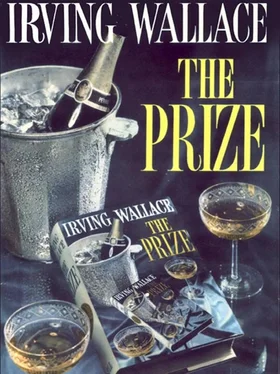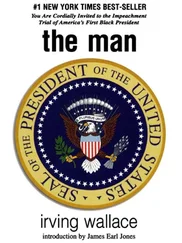As an impressionable adolescent accompanying his father on a royal liaison mission, he had been privileged to be in Alfred Nobel’s presence at least a dozen times, first in Paris, and then in the lonely villa at San Remo during 1896, the last year of Nobel’s life. In view of the fact that Jacobsson had been blessed with an inherited competence, he had been able to make the Nobel Foundation his vocation since 1900, the year preceding the first awards.
In recent years, because he had begun to place a value on his unique position and because he felt that he owed something to posterity, Jacobsson had begun his Notes. These were his memories of the past, jottings of the present, relating his knowledge of the secret voting sessions of the Nobel academies, impressions and anecdotes and activities of the various laureates, descriptions of the events and ceremonies, in all a priceless rag bag of history. Jacobsson had begun the Notes-there were now seventeen green ledgers filled in his crabbed hand-not many years past. The first entry had been made late the night following that November day when the Swedish Academy, in closed session in the Old Town, had voted the literary prize to an obscure Sardinian authoress, Grazia Deledda, instead of to Gabriele D’Annunzio, because the majority of members had privately objected to D’Annunzio’s amorous exploits and to his swindling a Danish widow of her home, Villa Carnacco, in Italy. That had been 1927. Since then, except when he was ill, Jacobsson had entered something, some fact, some gossip, each day. He had always supposed that it would be a book, a large, handsome published book, to justify his life somehow. But in recent years, he had realized that he would never write the book. For him, the contribution of the raw Notes would be enough. Someday, someday, some other would write the book.
Abruptly, Jacobsson shook himself free of self-absorption and re-entered the present moment, again a part of Ingrid Påhl and Carl Adolf Krantz and the limousine. The authoress was dozing lightly beside him. Krantz concentrated on the task of undoing a metal puzzle; he always carried several new ones in his pocket.
Idly, Jacobsson looked out of the car window at the Stockholm suburbs unreeling before his vision. Beyond the highway, the soft sloping hills were defiantly bronze-green despite the cold. Here and there, in sight and then gone, the rural barnlike wooden houses, most of them beige-coloured but cheerfully red-roofed. How he enjoyed this land, with its shiny lakes and birch trees and clusters of primeval forest and gaping open spaces filled only by Scandinavia ’s cerulean sky endlessly welded to the verdant earth. Actually, he thought, this was Ingrid Påhl’s dominion. In her slender volumes, she had staked out her possession by adoption and love. Essentially, Jacobsson knew, he was a city being. He left the cocoon of the city only in December, on these occasions, and was forever surprised at the visual wonders of the surrounding countryside and his pleasure in them. Annually, each December, he vowed to return, for an outing, a vacation, but by January all resolve had evaporated and he was part of and one with his metropolis again.
‘Bertil.’ It was Ingrid Påhl’s voice that brought him out of his trance.
He swung around, attentive. She was fully awake now, inserting a fresh cigarette in her holder, and then lighting it. He waited.
‘Bertil,’ she repeated, coughing smoke, ‘here we are, and I do not even know our schedule. Is it strenuous?’
‘You mean our receptions? Not at all.’ He dug inside his overcoat, and then inside his suit jacket and removed a folded sheet of onionskin paper. As he opened it, he saw that Krantz was also interested. ‘Here it is,’ said Jacobsson. ‘Shall I read it aloud?’
‘Please,’ said Ingrid Påhl. ‘I cannot read in a moving vehicle.’
Jacobsson brought the open sheet closer to his face. ‘December one. That’s today. Two twenty-five, afternoon. Dr. Denise Marceau. Dr. Claude Marceau. By Air France at Arlanda Airport. This evening. Seven o’clock. Dr. Carlo Farelli and Mrs. Farelli. By Scandinavian Airlines. Also Arlanda. December two. That’s tomorrow. Eight in the morning. Professor Max Stratman and-’
‘Eight in the morning,’ groaned Ingrid Påhl.
‘He is worth welcoming at any hour,’ Krantz snapped at her.
‘-and his niece,’ Jacobsson read, hurrying on. ‘By train from Göteborg. Central Station. Twelve thirty-five tomorrow afternoon. Dr. John Garrett and Mrs. Garrett. By Scandinavian Airlines. Arlanda Airport. On the same flight from Copenhagen, Mr. Andrew Craig and his sister-in-law.’
Krantz snorted. ‘Sister-in-law. Now, we pay for them, too?’
‘He is a widower,’ Ingrid Påhl answered angrily. ‘Do you want him to come alone?’
‘Please,’ interjected Jacobsson. He studied his sheet, then lowered and folded it. ‘As I said, Mr. Craig will be on the same flight with the Garretts. That will make all of them. So you see, Ingrid, the reception part of our duties will be done with and over by early afternoon tomorrow.’ He returned the paper to his inner pocket. ‘Of course, after that, there will be our other little duties. But I am certain they will be stimulating. And, as usual, the Foreign Office is loaning us several energetic attachés to help out when you and Carl wish to nap.’
‘The French couple we are going to meet right now, I do not know a thing about them,’ said Ingrid Påhl. ‘What should we know, Bertil?’
Jacobsson shrugged. ‘What is there to know? They are renowned and dedicated chemists. Despite Carl’s dissent, their discovery has met with universal acclaim. Except for the cuttings from the Paris newspapers-mostly features and interviews about their work-I know nothing of them personally.’ He nodded across the seat. ‘I think that is more Carl’s department.’
Momentarily, Krantz’s stubby fingers ceased working the metal puzzle. ‘They were proposed last year and this year, among five hundred others. There was the general weeding out, and then our committee of five recommended the Marceaus along with half a dozen others. I heard the lengthy investigation reports of our chemistry experts, and they were highly favourable, as you know. But there was little in these reports about the personalities of the winners. As far as I have been able to learn, they are both in their forties. He is older by several years. They have been married a dozen years or more. They have been dedicated to the idiot sperm project six or seven years, I think. They work in the Institut Pasteur, although not officially connected with it. They do not seem to have any interests, outside their work-like most of us in science. I would suppose, being married to each other, and their work, they will be inseparable and of the same mind. Somewhat dull, I predict.’
‘Oh, I wonder about that,’ said Ingrid Påhl. ‘I am perfectly fascinated by married couples performing outside their marriage as collaborators. It happens so often in the sciences. I wonder why it does not happen in the arts. Can you imagine a play by Anne and William Shakespeare? Or a novel by Catherine and Charles Dickens? Or a painting by Mette Sophie and Paul Gauguin? I suppose this does not happen because creativity in the arts is more individual.’
‘Nonsense,’ said Krantz.
Again, Jacobsson sought to prevent conflict. ‘No matter what the reasons, the sciences have seemed to produce some remarkable married teams.’ His mind went back to the Notes. ‘I think immediately of Madame Marie Curie and Pierre Curie. They shared the physics award in-when was it?-yes, 1903, with Professor Henri Becquerel. That was for their joint researches on radiation phenomena. As I recall, the Curies each got one-quarter of the prize, and Becquerel got one-half. I remember my disappointment when we learned that the Curies were too exhausted from overwork to attend our Ceremony. The French Minister to Sweden picked up their award.’
Читать дальше












